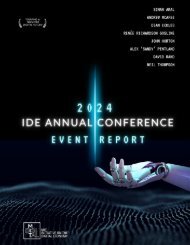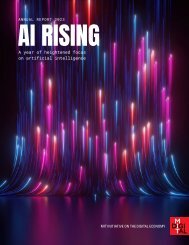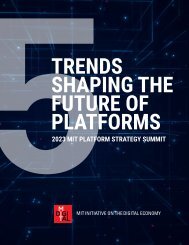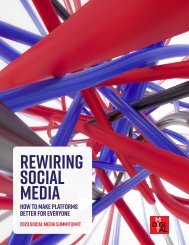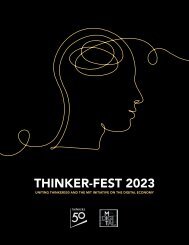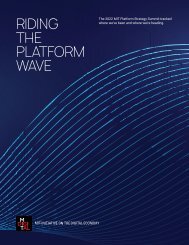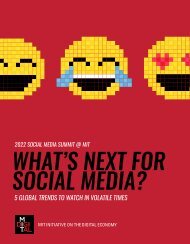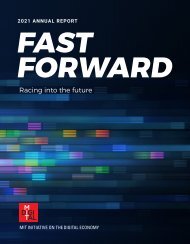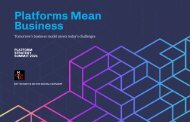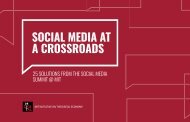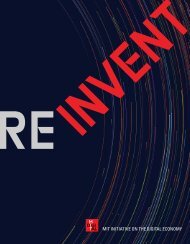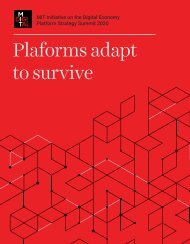MIT IDE Special Report: COVID-19 and The Impact On Our Digital Economy
Create successful ePaper yourself
Turn your PDF publications into a flip-book with our unique Google optimized e-Paper software.
OUR WORLD ACCELERATED<br />
<strong>COVID</strong>-<strong>19</strong> AND THE IMPACT ON OUR DIGITAL ECONOMY
From pizza parlors to platform<br />
giants, frontline workers to CEOs,<br />
the <strong>COVID</strong>-<strong>19</strong> p<strong>and</strong>emic struck<br />
the economy a devastating blow..<br />
<strong>MIT</strong> <strong>IDE</strong> <strong>COVID</strong>-<strong>19</strong><br />
Rapid Response Hub<br />
Research Areas<br />
<strong>Impact</strong> of<br />
government<br />
interventions <strong>and</strong><br />
social distancing on<br />
the p<strong>and</strong>emic<br />
In the U.S., when the economy ground to a halt last<br />
spring, the digital economy boomed while the brick<br />
<strong>and</strong> mortar economy suffered tremendously. Nearly<br />
all businesses not only had to pivot, but make critical,<br />
unprecedented decisions. In the midst of the crisis,<br />
researchers at the <strong>MIT</strong> Initiative on the <strong>Digital</strong> <strong>Economy</strong><br />
(<strong>IDE</strong>) went to work analyzing data <strong>and</strong> mapping trends<br />
to guide business leaders <strong>and</strong> policymakers alike—with<br />
facts. What would be the impact of massive work-fromhome<br />
employment? How can supply chains be improved?<br />
Is the shift to telehealth now entrenched? And what role<br />
do social media platforms play in how the world has<br />
responded to vaccination <strong>and</strong> the overall crisis?<br />
Over the last year, our world-renowned research<br />
team worked tirelessly to provide timely, accurate,<br />
<strong>and</strong> data-informed analysis of the p<strong>and</strong>emic <strong>and</strong><br />
its effects. <strong>Our</strong> researchers have analyzed the vast<br />
impact of <strong>COVID</strong>-<strong>19</strong> on society, technology, <strong>and</strong> the<br />
global economy to provide actionable solutions for<br />
policymakers, business leaders, <strong>and</strong> citizens. We<br />
collaborated with the World Health Organization,<br />
Facebook, Safegraph, Praekelt, <strong>and</strong> Graphika Inc.<br />
to analyze millions of data points to help stop the<br />
spread of the coronavirus <strong>and</strong> to advise local <strong>and</strong><br />
global leaders on critical next steps. What follows<br />
are highlights of our year-long efforts.<br />
Economic fallout<br />
<strong>and</strong> business<br />
implications of<br />
<strong>COVID</strong>-<strong>19</strong>, <strong>and</strong><br />
post-p<strong>and</strong>emic<br />
planning<br />
Fighting coronavirus<br />
misinformation <strong>and</strong><br />
bias, <strong>and</strong> the role of<br />
social media<br />
In this report<br />
<strong>Digital</strong> technology<br />
<strong>and</strong> <strong>COVID</strong>-<strong>19</strong><br />
3<br />
Spotlight:<br />
Dean Eckles<br />
4<br />
Spotlight:<br />
Sinan Aral<br />
6<br />
Spotlight:<br />
David R<strong>and</strong><br />
8<br />
Key<br />
takeaways<br />
Vaccine<br />
acceptance
DEAN<br />
ECKLES<br />
@deaneckles<br />
Dean Eckles is the Mitsubishi Career<br />
Development Professor <strong>and</strong> an associate<br />
professor of marketing at <strong>MIT</strong> Sloan.<br />
He heads the Social Networks <strong>and</strong><br />
<strong>Digital</strong> Experimentation Research Group<br />
at the <strong>MIT</strong> <strong>IDE</strong>. His research primarily<br />
focuses on how technology <strong>and</strong> social<br />
interaction impact people’s response to<br />
the <strong>COVID</strong>-<strong>19</strong> p<strong>and</strong>emic.<br />
FULL BIO<br />
<strong>COVID</strong>-<strong>19</strong> BELIEFS, BEHAVIORS & NORMS SURVEY<br />
Dean Eckles, Sinan Aral, Alex Moehring, Avinash Collis, Kiran Garimella, <strong>and</strong><br />
M. Amin Rahimian<br />
Vaccine acceptance<br />
In collaboration with Facebook <strong>and</strong> Johns Hopkins University, <strong>and</strong> with<br />
input from experts at the World Health Organization <strong>and</strong> the Global<br />
Outbreak Alert <strong>and</strong> Response Network, the team fielded the world’s<br />
largest survey on <strong>COVID</strong>-<strong>19</strong> beliefs, behaviors, <strong>and</strong> perceptions. <strong>The</strong><br />
team found that providing accurate information about how others in<br />
their country practice <strong>and</strong> accept vaccination, mask wearing, or social<br />
distancing positively influenced their beliefs <strong>and</strong> intentions to accept<br />
a vaccine. Providing this type of information can partially correct<br />
individuals’ underestimation of how many others in their network,<br />
community, <strong>and</strong>/or country will accept a vaccine.<br />
KEY FINDINGS<br />
4<br />
4<br />
4<br />
4<br />
34% of adults surveyed felt<br />
<strong>COVID</strong>-<strong>19</strong> risk was very<br />
dangerous to their community<br />
65% of adults surveyed said<br />
they would choose to get<br />
vaccinated if a vaccine for<br />
<strong>COVID</strong>-<strong>19</strong> became available<br />
55% of those surveyed felt it<br />
was extremely important to<br />
take preventative actions<br />
against the spread of <strong>COVID</strong>-<strong>19</strong><br />
31.5% of survey respondents<br />
felt that people in their<br />
community think it is extremely<br />
important to take actions to<br />
prevent the spread of <strong>COVID</strong>-<strong>19</strong><br />
<strong>The</strong> Cost of Uncoordinated Responses<br />
to <strong>COVID</strong>-<strong>19</strong><br />
Interdependence <strong>and</strong> the Cost of<br />
Uncoordinated Responses to <strong>COVID</strong>-<strong>19</strong><br />
THE WORLD’S LARGEST <strong>COVID</strong>-<strong>19</strong> SURVEY TOUCHED 23 COUNTRIES<br />
A sample of Facebook users were invited to respond to the survey from<br />
the United States, India, United Kingdom, Mexico, Argentina, Brazil,<br />
Colombia, Italy, France, Germany, Romania, Pol<strong>and</strong>, Pakistan, Turkey,<br />
Bangladesh, Vietnam, Thail<strong>and</strong>, Malaysia, Indonesia, Japan, Philippines,<br />
Egypt, <strong>and</strong> Nigeria.<br />
SURFACING NORMS IN HEALTH COMMUNICATIONS<br />
INCREASES VACCINE ACCEPTANCE<br />
Dean Eckles, Sinan Aral, Alex Moehring, Avinash Collis, Kiran<br />
Garimella, <strong>and</strong> M. Amin Rahimian<br />
Vaccine acceptance<br />
What affects people’s choice to accept or seek out safe<br />
<strong>and</strong> effective <strong>COVID</strong>-<strong>19</strong> vaccines? Eckles <strong>and</strong> his research<br />
team explore vaccine acceptance <strong>and</strong> specifically how<br />
social influence <strong>and</strong> the right public health messaging<br />
can influence people’s behavior regardless of their<br />
baseline beliefs.<br />
Surfacing norms to increase vaccine acceptance<br />
Op-ed with Sinan Aral: Why public health messaging<br />
should emphasize vaccine acceptance, not hesitancy<br />
SNAPSHOT<br />
WAVES<br />
‘Waves’ countries were surveyed continuously in two-week periods.<br />
‘Snapshot’ countries were surveyed once from July 1-August 3, 2020.<br />
3
<strong>IDE</strong> RELEASES FIRST COMPREHENSIVE<br />
EVALUATION OF U.S. <strong>COVID</strong>-<strong>19</strong><br />
REOPENING POLICIES<br />
Sinan Aral <strong>and</strong> Michael Zhao<br />
<strong>Impact</strong> of government interventions <strong>and</strong><br />
social distancing on the p<strong>and</strong>emic<br />
Aral’s 2020 research showed that a local<br />
government’s social distancing policies<br />
can impact the health outcomes of other<br />
communities, regardless of geographical<br />
proximity. Peoples’ behaviors are influenced<br />
by their local communities <strong>and</strong> their<br />
social connectivity, <strong>and</strong> their perceptions<br />
of the effectiveness of local policies can<br />
be substantially altered by their social<br />
connections. <strong>The</strong> data shows that individuals’<br />
adherence to social distancing is impacted<br />
by the policies of the regions where their<br />
social network connections reside.<br />
SINAN<br />
ARAL<br />
@sinanaral<br />
Sinan Aral is the David Austin Professor of<br />
Management at <strong>MIT</strong> Sloan <strong>and</strong> the director<br />
of the <strong>MIT</strong> <strong>IDE</strong>. He is a global thought leader<br />
on social media, social networks, <strong>and</strong> the<br />
impact they have on the digital economy.<br />
Aral’s research focuses heavily on the<br />
efficacy of government policies in response<br />
to <strong>COVID</strong>-<strong>19</strong> <strong>and</strong> the impact that social<br />
media has had on the response. He also<br />
offers data-driven predictions of what lies<br />
ahead in a post-p<strong>and</strong>emic world.<br />
FULL BIO<br />
GOING REMOTE Previously a nice “option” for digital economy workers to consider working from home,<br />
the p<strong>and</strong>emic forced a paradigm shift that will likely make remote work the norm rather than the extreme.<br />
At the <strong>IDE</strong>, we are measuring it all.<br />
WHAT HAPPENS TO INDUSTRY AND JOBS<br />
AFTER <strong>COVID</strong>-<strong>19</strong>?<br />
Featuring Sinan Aral<br />
Economic fallout <strong>and</strong> business implications of<br />
<strong>COVID</strong>-<strong>19</strong> <strong>and</strong> post-p<strong>and</strong>emic planning<br />
<strong>MIT</strong> Sloan’s Ideas Made to Matter spoke with<br />
Sinan Aral <strong>and</strong> four other experts at the <strong>MIT</strong> <strong>IDE</strong> to<br />
get their perspectives on how digital technology<br />
will impact the future of work in a post-p<strong>and</strong>emic<br />
world. Social media enabled researchers like Aral<br />
to collect information from people around the world<br />
that would help inform global policy <strong>and</strong> response<br />
to the <strong>COVID</strong>-<strong>19</strong> p<strong>and</strong>emic.<br />
What Happens to Industry <strong>and</strong> Jobs After <strong>COVID</strong>-<strong>19</strong>?<br />
THE ECONOMIC FALLOUT FROM<br />
<strong>COVID</strong>-<strong>19</strong><br />
Sinan Aral<br />
Economic fallout <strong>and</strong> business implications of<br />
<strong>COVID</strong>-<strong>19</strong> <strong>and</strong> post-p<strong>and</strong>emic planning<br />
<strong>MIT</strong> <strong>IDE</strong> Director Sinan Aral offers a five-point plan<br />
of action to stave off a global meltdown.<br />
At the start of the p<strong>and</strong>emic, Aral offered advice<br />
to business leaders <strong>and</strong> policymakers in an effort<br />
to preclude a cataclysmic economic disaster. <strong>On</strong>e<br />
year later, we reflect: How much of Aral’s advice<br />
was heeded? How is the economy faring?<br />
Economic Fallout from <strong>COVID</strong>-<strong>19</strong><br />
KEY FINDINGS<br />
4<br />
4<br />
4<br />
4<br />
Counties under statewide shelter-inplace<br />
orders received 8%-14% less<br />
cross-state traffic compared to prep<strong>and</strong>emic<br />
levels.<br />
As expected, re-openings boosted<br />
travel to destination counties—<strong>and</strong><br />
their bars, restaurants, <strong>and</strong> beaches—<br />
by 12%-13%.<br />
When a location reopened <strong>and</strong><br />
another was still locked down, people<br />
from lockdown counties flooded to<br />
the reopened destination—by 11%-12%<br />
from nearby counties, <strong>and</strong> 24% from<br />
distant counties.<br />
If the origin location reopened but<br />
the destination was still closed, travel<br />
to both nearby <strong>and</strong> distant closed<br />
counties was curbed by 9%-17% <strong>and</strong><br />
21%-27% respectively.<br />
Study Reveals True Reasons for <strong>COVID</strong>-<strong>19</strong><br />
Flare-ups<br />
<strong>The</strong> Interdependent <strong>Impact</strong>s of Regional<br />
<strong>COVID</strong>-<strong>19</strong> Reopenings in the United States<br />
4
SINAN<br />
IN THE<br />
MEDIA<br />
Social media giants like Facebook<br />
have gone ‘out of their way’ to make<br />
more information available<br />
Sinan Aral joined Yahoo! Finance’s <strong>On</strong><br />
<strong>The</strong> Move panel to highlight how social<br />
media is h<strong>and</strong>ling information amid the<br />
coronavirus p<strong>and</strong>emic.<br />
Study: <strong>The</strong>re will be a “devastating cost<br />
of failure” if economic re-openings are<br />
not coordinated<br />
Read coverage of this study in the<br />
TechRepublic<br />
Read Sinan’s op-ed on this topic in<br />
<strong>The</strong> Hill<br />
Watch Sinan’s interview with WGBH<br />
on this topic<br />
Watch Sinan’s interview with<br />
MSNBC’s Meet the Press on this topic<br />
THE COST OF UNCOORDINATED RESPONSES TO <strong>COVID</strong>-<strong>19</strong><br />
Dean Eckles, Sinan Aral, David Holtza, Michael Zhao, Seth G. Benzell, Cathy Y.<br />
Caoa, M. Amin Rahimiana, Jeremy Yanga, Jennifer Allena, Avinash Collisa, Alex<br />
Moehringa, Tara Sowrirajanc, Dipayan Ghosha, Yunhao Zhanga, Paramveer S.<br />
Dhillone, <strong>and</strong> Christos Nicolaides<br />
<strong>Impact</strong> of government interventions <strong>and</strong> social distancing on<br />
the p<strong>and</strong>emic<br />
Eckles <strong>and</strong> his research team produced a comprehensive<br />
study of the cost of uncoordinated U.S. responses to <strong>COVID</strong>-<strong>19</strong>, <strong>and</strong><br />
found that ad hoc local shutdowns <strong>and</strong> re-openings underscored an<br />
urgent need for intervention on a national level. Findings show that<br />
people can be significantly influenced by the policies <strong>and</strong> behaviors<br />
of those in other, sometimes distant, regions. <strong>The</strong> research shows<br />
that countries <strong>and</strong> states that reopen without national coordination<br />
face significant difficulty controlling the resurgent spread of the<br />
coronavirus. When people move across borders with relative ease,<br />
there is a substantial, <strong>and</strong> often deadly, impact.<br />
<strong>The</strong> Cost of Uncoordinated Responses to <strong>COVID</strong>-<strong>19</strong><br />
Interdependence <strong>and</strong> the Cost of Uncoordinated<br />
Responses to <strong>COVID</strong>-<strong>19</strong><br />
DATA ANALYTICS HOLDS THE KEY TO RE-OPENING THE U.S.<br />
Seth Benzell, Avinash Collis, <strong>and</strong> Christos Nicolaides<br />
<strong>Impact</strong> of government interventions <strong>and</strong> social distancing on<br />
the p<strong>and</strong>emic<br />
As a direct response to the policies that were enacted in certain U.S.<br />
states, researchers at the <strong>IDE</strong> conducted a study that would<br />
aid policymakers in the absence of empirical data. <strong>The</strong> researchers<br />
studied data—based on millions of smartphone geolocation data<br />
points <strong>and</strong> government statistics—across all 50 states to determine<br />
which areas <strong>and</strong> types of businesses would be the highest risk to<br />
reopen, <strong>and</strong> assess the priority of reopening certain businesses or<br />
practices over others.<br />
<strong>The</strong> hope was that policymakers would use the data to make better<br />
informed decisions. According to <strong>IDE</strong> researchers, some U.S. states<br />
enacted policies that directly contradicted the research findings.<br />
“What is social media’s impact<br />
on society—<strong>and</strong> how do we<br />
regulate it, use it, design it, <strong>and</strong><br />
harness it to create positive<br />
outcomes rather than peril?<br />
<strong>COVID</strong>-<strong>19</strong> put this question<br />
front <strong>and</strong> center because<br />
everyone was forced into<br />
remote socialization.”<br />
Sinan Aral, What Happens to Industry <strong>and</strong> Jobs<br />
After <strong>COVID</strong>-<strong>19</strong>?<br />
Data Analytics Holds the Key to Re-opening the U.S.<br />
5
FIGHTING <strong>COVID</strong>-<strong>19</strong><br />
MISINFORMATION ON SOCIAL<br />
MEDIA: EXPERIMENTAL EV<strong>IDE</strong>NCE<br />
FOR A SCALABLE ACCURACY NUDGE<br />
INTERVENTION<br />
David R<strong>and</strong>, Gordon Pennycook, Jonathon<br />
McPhetres, <strong>and</strong> Yunhao Zhang<br />
Fighting coronavirus misinformation <strong>and</strong><br />
bias <strong>and</strong> the role of social media<br />
<strong>The</strong> <strong>COVID</strong>-<strong>19</strong> p<strong>and</strong>emic has bred a multitude<br />
of falsehoods that are being spread across<br />
every social platform around the globe.<br />
<strong>IDE</strong> researchers investigated the science<br />
behind the spread of misinformation, <strong>and</strong><br />
why people are prone to believing <strong>and</strong><br />
spreading false news. Across two studies<br />
with more than 1,600 participants, the<br />
researchers found that people share false<br />
claims about <strong>COVID</strong>-<strong>19</strong> in part because they<br />
simply fail to think sufficiently about whether<br />
or not content is accurate when deciding<br />
what to share.<br />
VACCINE MISINFORMATION Politics, geography, <strong>and</strong> race all expose the barriers we must overcome<br />
to reach herd immunity through <strong>COVID</strong>-<strong>19</strong> vaccination.<br />
Fighting <strong>COVID</strong>-<strong>19</strong> Misinformation on<br />
Social Media<br />
DAVID<br />
RAND<br />
@DG_R<strong>and</strong><br />
David R<strong>and</strong> is the Erwin H. Schell Professor<br />
<strong>and</strong> an associate professor of Management<br />
Science <strong>and</strong> Brain <strong>and</strong> Cognitive Sciences<br />
at <strong>MIT</strong> Sloan, <strong>and</strong> leads the Misinformation<br />
<strong>and</strong> Fake News Research Group at the <strong>MIT</strong><br />
<strong>IDE</strong>. R<strong>and</strong>’s research focuses on the spread<br />
of misinformation about the <strong>COVID</strong>-<strong>19</strong><br />
p<strong>and</strong>emic, <strong>and</strong> the psychology behind<br />
the perceptions <strong>and</strong> biases that fuel<br />
society’s response.<br />
FULL BIO<br />
BELIEFS ABOUT <strong>COVID</strong>-<strong>19</strong> IN CANADA,<br />
THE U.K., AND THE U.S.A.: A NOVEL TEST<br />
OF POLITICAL POLARIZATION AND<br />
MOTIVATED REASONING<br />
David R<strong>and</strong>, Gordon Pennycook, Jonathon McPhetres,<br />
<strong>and</strong> Bence Bago<br />
Fighting coronavirus misinformation <strong>and</strong><br />
bias <strong>and</strong> the role of social media<br />
In a two-wave study completed early <strong>and</strong> later<br />
in the p<strong>and</strong>emic, R<strong>and</strong> <strong>and</strong> his team found that<br />
political conservatism in the U.S. contributed<br />
to a greater polarization around beliefs about<br />
<strong>COVID</strong>-<strong>19</strong> than in the U.K. <strong>and</strong> Canada.<br />
<strong>COVID</strong>-<strong>19</strong> skepticism in the U.S. was strongly<br />
correlated with distrust in liberal-leaning<br />
mainstream news outlets <strong>and</strong> trust in<br />
conservative-leaning news outlets, suggesting<br />
that polarization may be driven by differences<br />
in information environments.<br />
Beliefs about <strong>COVID</strong>-<strong>19</strong> in Canada, the<br />
U.K., <strong>and</strong> the U.S.A.<br />
HOW IS RACE ASSOCIATED WITH<br />
PERCEPTIONS OF FUTURE <strong>COVID</strong>-<strong>19</strong><br />
VACCINES?<br />
David R<strong>and</strong> <strong>and</strong> Charles Senteio<br />
Vaccine acceptance<br />
<strong>The</strong>re is no denying that <strong>COVID</strong> is a global<br />
health <strong>and</strong> economic crisis, but communities<br />
of color continue to experience higher<br />
infection <strong>and</strong> mortality rates <strong>and</strong> financial<br />
strain. Coupled with the preexisting issue<br />
of persistent mistrust of the healthcare<br />
system, this has created a widespread issue<br />
with vaccine acceptance among minority<br />
populations. R<strong>and</strong> <strong>and</strong> his fellow researcher<br />
at <strong>COVID</strong>-<strong>19</strong> <strong>and</strong> Race, Charles Senteio are<br />
actively studying this issue to offer datadriven<br />
recommendations <strong>and</strong> analysis.<br />
<strong>COVID</strong>-<strong>19</strong> <strong>and</strong> Race<br />
80%<br />
70%<br />
60%<br />
50%<br />
40%<br />
30%<br />
20%<br />
10%<br />
0%<br />
TRUE<br />
FALSE<br />
JUST A NUDGE HELPS<br />
Percentage of “yes” responses by headline<br />
veracity (true vs false) <strong>and</strong> condition (accuracy<br />
= “To the best of your knowledge, is the claim<br />
in the above headline accurate?”; sharing =<br />
“Would you consider sharing this story online<br />
(for example, through Facebook or Twitter)?”).<br />
Error bars indicate 95% confidence intervals.<br />
6
“<strong>COVID</strong>-<strong>19</strong><br />
presents<br />
a unique<br />
opportunity<br />
to test<br />
psychological<br />
theories<br />
about political<br />
polarization<br />
<strong>and</strong> science<br />
beliefs in the<br />
context of<br />
a novel test<br />
case.”<br />
Beliefs about <strong>COVID</strong>-<strong>19</strong> in Canada,<br />
the U.K., <strong>and</strong> the U.S.A.: A novel test<br />
of political polarization <strong>and</strong> motivated<br />
reasoning by David R<strong>and</strong> et al.<br />
DON’T GET IT OR DON’T SPREAD IT?<br />
COMPARING SELF-INTERESTED<br />
VERSUS PRO SOCIALLY FRAMED<br />
<strong>COVID</strong>-<strong>19</strong> PREVENTION<br />
MESSAGING<br />
David R<strong>and</strong>, Jillian Jordan, <strong>and</strong> Erez Yoeli<br />
<strong>Impact</strong> of government interventions <strong>and</strong><br />
social distancing on the p<strong>and</strong>emic<br />
Should public health messaging focus on<br />
the benefits of prevention to individuals,<br />
society, or both? How can we motivate<br />
preventative actions? R<strong>and</strong> <strong>and</strong> his team<br />
of researchers found strong evidence<br />
for the power of prosocial framing.<br />
<strong>The</strong> results of their study suggest that<br />
emphasizing the public benefits of<br />
prevention efforts may be an effective<br />
p<strong>and</strong>emic response strategy.<br />
Don’t Get It or Don’t Spread It?<br />
TURKING IN THE TIME OF <strong>COVID</strong><br />
David R<strong>and</strong> <strong>and</strong> Antonio Arechar<br />
Economic fallout <strong>and</strong> business implications<br />
of <strong>COVID</strong>-<strong>19</strong> <strong>and</strong> post-p<strong>and</strong>emic planning<br />
Amazon Mechanical Turk, or MTurk, is a crowdsourcing website<br />
for businesses to hire remotely located “crowdworkers” to<br />
perform discrete on-dem<strong>and</strong> tasks that computers are currently<br />
unable to do. R<strong>and</strong> <strong>and</strong> his research team studied the effects that<br />
government shutdowns <strong>and</strong> strict social distancing protocols had<br />
on the job market, <strong>and</strong> specifically, how the p<strong>and</strong>emic is affecting<br />
online labor markets like MTurk. <strong>The</strong>se online labor markets play<br />
a significant role in social science research, <strong>and</strong> they explore<br />
whether the p<strong>and</strong>emic has had any effect on the subject pool<br />
available on crowdsourcing marketplaces.<br />
PERSONAL PUBLIC + PRIVATE PUBLIC GOOD<br />
MESSAGING MATTERS After subjects finished reading the text in the experiment, they were<br />
asked to carefully read a flier about <strong>COVID</strong>-<strong>19</strong>. This flier varied across treatments, again by<br />
emphasizing threat to the subject, their community, or both.<br />
ENCOURAGING THE RESUMPTION OF ECONOMIC<br />
ACTIVITY AFTER <strong>COVID</strong>-<strong>19</strong>: EV<strong>IDE</strong>NCE FROM A<br />
LARGE SCALE FIELD EXPERIMENT IN CHINA<br />
David R<strong>and</strong>, Juan Palacios,Yichun Fan, Erez Yoeli, Jianghao Wang,<br />
Yuchen Chai, Weizeng Sun, <strong>and</strong> Siqi Zheng<br />
Economic fallout <strong>and</strong> business implications<br />
of <strong>COVID</strong>-<strong>19</strong> <strong>and</strong> post-p<strong>and</strong>emic planning<br />
As the spread of the <strong>COVID</strong>-<strong>19</strong> p<strong>and</strong>emic diminishes,<br />
governments find themselves facing a new challenge:<br />
motivating citizens to resume economic activity. R<strong>and</strong> <strong>and</strong><br />
his team investigate this issue using a field experiment in<br />
the city of Zhengzhou, China, immediately following the end<br />
of the city’s <strong>COVID</strong>-<strong>19</strong> lockdown.<br />
Turking in the Time of <strong>COVID</strong><br />
Encouraging the resumption of economic activity after<br />
<strong>COVID</strong>-<strong>19</strong><br />
7
KEY<br />
TAKEAWAYS<br />
OUR WORK<br />
CONTINUES<br />
<strong>The</strong> impact of<br />
government<br />
interventions<br />
<strong>and</strong> social<br />
distancing on<br />
the p<strong>and</strong>emic is<br />
critical.<br />
<strong>The</strong> lack of a coordinated,<br />
national government response<br />
to the p<strong>and</strong>emic had varying<br />
effects on the population’s<br />
response to social distancing<br />
measures. <strong>The</strong> <strong>IDE</strong> research<br />
team analyzed the data <strong>and</strong><br />
explored the varying degrees<br />
of effectiveness in controlling<br />
the spread of the virus.<br />
Post-p<strong>and</strong>emic<br />
planning is<br />
key to the<br />
economic fallout<br />
<strong>and</strong> business<br />
implications of<br />
<strong>COVID</strong>-<strong>19</strong>.<br />
<strong>The</strong> p<strong>and</strong>emic will have<br />
lasting effects on the world’s<br />
economy. <strong>IDE</strong> researchers<br />
explore everything from<br />
reopening strategies <strong>and</strong><br />
the resumption of economic<br />
activity, to industry trends<br />
<strong>and</strong> jobs in our new reality.<br />
Social media<br />
has a huge role<br />
in creating<br />
<strong>and</strong> fighting<br />
coronavirus<br />
misinformation<br />
<strong>and</strong> bias.<br />
<strong>IDE</strong> researchers investigate<br />
the science behind the<br />
spread of misinformation,<br />
the influence social media<br />
has on people’s beliefs<br />
about the p<strong>and</strong>emic, <strong>and</strong><br />
why people are prone to<br />
believing <strong>and</strong> spreading<br />
false news.<br />
<strong>Digital</strong><br />
technology<br />
helped track<br />
<strong>COVID</strong>-<strong>19</strong> <strong>and</strong><br />
transformed<br />
the nature of<br />
work.<br />
<strong>The</strong> p<strong>and</strong>emic has spurred<br />
rapid developments in<br />
the technology space.<br />
Researchers at the <strong>IDE</strong><br />
explore the role that digital<br />
technology—such as AI <strong>and</strong><br />
remote access—has played in<br />
healthcare <strong>and</strong> business, <strong>and</strong><br />
how it’s helped governments<br />
track p<strong>and</strong>emic patterns.<br />
Vaccine<br />
acceptance<br />
is still<br />
unfolding<br />
but there are<br />
remedies for<br />
improvement.<br />
<strong>The</strong> <strong>IDE</strong> is on the cutting<br />
edge of vaccine acceptance<br />
research. Researchers<br />
have conducted the<br />
world’s largest survey on<br />
vaccine acceptance <strong>and</strong><br />
are actively studying the<br />
effects of messaging <strong>and</strong><br />
misinformation on peoples’<br />
beliefs <strong>and</strong> biases regarding<br />
the <strong>COVID</strong>-<strong>19</strong> vaccine.<br />
<strong>Digital</strong> technology has been a balm to<br />
the wounds of the p<strong>and</strong>emic. From data<br />
analytics to newly created platforms, <strong>IDE</strong><br />
researchers are contributing solutions<br />
with long-lasting impact to the enormous<br />
problems caused by <strong>COVID</strong>-<strong>19</strong>.<br />
<strong>Our</strong> researchers are global thought<br />
leaders at the forefront of the<br />
conversations surrounding <strong>COVID</strong>-<strong>19</strong>.<br />
<strong>The</strong>ir groundbreaking <strong>and</strong> ongoing work<br />
continues to aid policymakers in creating<br />
actionable solutions to this health <strong>and</strong><br />
economic crisis.<br />
<strong>The</strong> focus of our research continues to<br />
evolve at the same rapid pace of the<br />
p<strong>and</strong>emic. To stay abreast of the important<br />
work we’re doing on this timely topic, visit<br />
our <strong>COVID</strong>-<strong>19</strong> Rapid Response Hub for<br />
additional resources <strong>and</strong> further reading.<br />
<strong>IDE</strong> <strong>COVID</strong>-<strong>19</strong> RAPID RESPONSE HUB<br />
Learn about future events, research projects, book releases, <strong>and</strong> other noteworthy happenings at the <strong>IDE</strong>.<br />
SUBSCRIBE TO OUR NEWSLETTER<br />
8



